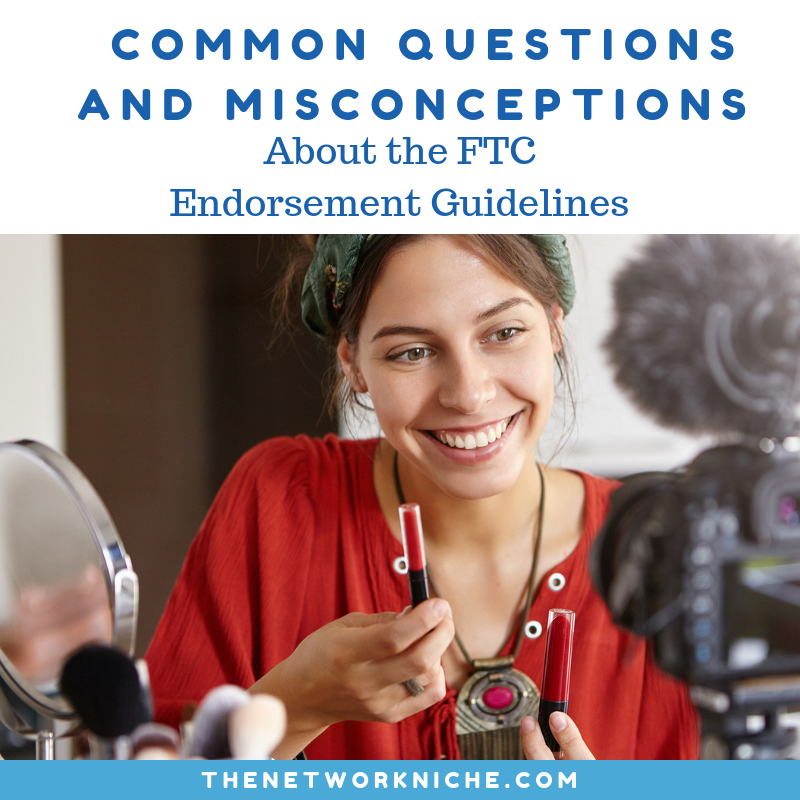In 2009, The Federal Trade Commission, the independent agency that protects consumers by preventing anticompetitive, deceptive, and unfair business practices, published an update to the FTC Guidelines known as the “Guides Concerning Use of Endorsements and Testimonials in Advertising,” commonly referred to as the Endorsement Guidelines or FTC Guidelines.
The 2009 Endorsement Guidelines addressed what constitutes an endorsement by a blogger or influencer who promotes a product that they either received for free or for payment. Examples were given to illustrate the long-standing principle that “material connections” (sometimes payments or free products) between advertisers and endorsers – connections that consumers would not expect – must be disclosed. The Revised Guides stated that in most cases where a blogger received cash or in-kind payment to review a product, it serves as an endorsement of the product. If bloggers endorse products on their blogs or on social media, the bloggers should disclose the “material connection” they share with the seller of the product or service by including a disclosure.
The guidelines include examples of what constitutes an endorsement. In one example, a movie-goer receives a free ticket to a movie and then later is asked to endorse the movie on camera. In another scenario, a blogger received a free gaming system and was asked to endorse the game on his blog.
Examples of acceptable disclosures have been shared by the FTC in informal subsequent articles and releases.
The FTC stated that The Guides were not law, but, “administrative interpretations of the law intended to help advertisers comply with the Federal Trade Commission Act; they are not binding law themselves.”
Simply put, in most cases where a blogger or influencer (including celebrities) receives a product or is paid to endorse a product, the FTC recommends that,
1.) Bloggers disclose the nature of the relationship between the brand or service they are promoting.
and
2.) The disclosure should be both “clear” and “conspicuous,” and “use unambiguous language.”
Over the years, the FTC has issued several informal publications such as reminders, templates, and supplemental references, to clarify how bloggers, influencers, or celebrities should interpret the guidelines or address disclosures on new social media platforms. For example, in 2017, the FTC published a press release where it stated that 90 social media influencers had been contacted about some of their Instagram posts. It reminded influencers to “clearly disclose the relationship they have with brands they are working with.” There were two letters released including one letter to marketers that reminded them of their obligation to encourage compliance with the Guidelines. Although the press release provides an example that the hashtag #ad should be disclosed before the “more” in longer Instagram posts, the sample FTC letters did not specifically address this requirement nor did the FTC update the 2009 Guidelines to reflect the recommendation.
Since 2009, there have been many misconceptions about what the guidelines recommend, wrong applications of what is suggested, and just distribution of wrong information. I personally attended conference sessions where non-attorneys speaking as “subject matter experts” on the guidelines, misinterpreted and misinformed attendees about what the Guidelines recommend and even suggested there have been numerous updates since 2009. The misinformation spread like wildfire and soon everyone was adding the word “Paid” or #AD to the title of their blog posts because “it was the law” and “so and so” said “we must do it.”
No.
Non-lawyers should not attempt to give legal advice because that is the unlawful practice of law. The Rules of Professional Conduct that govern the code of ethics for lawyers and the legal profession state that non-lawyers should not give legal advice or engage in the unlawful practice law. Non-lawyers may, however, “recite the law.” Once non-lawyers start to, or attempt to interpret the law, they start to cross that fuzzy line of practicing law. “[I]t’s the difference between telling someone what to do (legal advice) as opposed to how to do it (legal information).”
While we’re on the subject of giving legal advice, as a licensed attorney I must share the following:
DISCLAIMER: Nothing contained in this post or associated shares should be construed as legal advice or the creation of an attorney-client relationship between you and I. Should you require legal advice please seek the assistance and advice of an attorney licensed to practice law in your state. Also, this post is current as of July 2018.

Now, let’s address common questions related to the FTC Endorsement Guidelines and some of the common misconceptions. I outlined some of the most commonly asked FTC questions I have heard or come across then did the research on what the FTC or the guidelines state. I included with my responses direct quotes from The FTC’s Endorsement Guides: What People Are Asking FAQ page, however, I emphasized some words in bold to highlight key statements.
Question: Are the FTC Guidelines “the law”?
What the FTC states:
The Guides are intended to give insight into what the FTC thinks about various marketing activities involving endorsements and how Section 5 might apply to those activities. The Guides themselves don’t have the force of law. However, practices inconsistent with the Guides may result in law enforcement actions alleging violations of the FTC Act. Law enforcement actions can result in orders requiring the defendants in the case to give up money they received from their violations and to abide by various requirements in the future. Despite inaccurate news reports, there are no “fines” for violations of the FTC Act.
What this means in plain English: No, the FTC Guidelines are not law. Section § 255.0 of The Guides “provide the basis for voluntary compliance with the law by advertisers and endorsers.” This means you will not be sued or “taken to court,” etc. Not yet, at least. This also means if you do influencer marketing, telling your influencers that, “the law states you must disclose in your title” is not accurate.
Question: Is the FTC cracking down on bloggers and influencers?
What the FTC states:
Are you monitoring bloggers?
Generally not, but if concerns about possible violations of the FTC Act come to our attention, we evaluate them case by case. If law enforcement becomes necessary, our focus usually will be on advertisers or their ad agencies and public relations firms. Action against an individual endorser, however, might be appropriate in certain circumstances, such as if the endorser has continued to fail to make required disclosures despite warnings.
What this means in plain Engish. Despite what you may have heard, there are no FTC staffers scouring the Internet looking for bloggers and influencers to crack down upon and issue heavy fines/sanctions. Instead, if a potential violation comes to the attention of the FTC, what will occur is that the FTC will likely contact the brand or agency you’re working with first, to take suggestive action. Furthermore, the statement referring to action “might be appropriate” for repeat offenders can be interpreted to mean that it’s possible the focus will shift to influencers if they are the repeat offenders.
Question: Are there fines for violating the FTC guidelines?
What the FTC states:
What is the legal basis for the Guides?
The FTC conducts investigations and brings cases involving endorsements made on behalf of an advertiser under Section 5 of the FTC Act, which generally prohibits deceptive advertising.
The Guides are intended to give insight into what the FTC thinks about various marketing activities involving endorsements and how Section 5 might apply to those activities. The Guides themselves don’t have the force of law. However, practices inconsistent with the Guides may result in law enforcement actions alleging violations of the FTC Act. Law enforcement actions can result in orders requiring the defendants in the case to give up money they received from their violations and to abide by various requirements in the future. Despite inaccurate news reports, there are no “fines” for violations of the FTC Act.
What this means in plain English: There are no fines for violating the FTC Guidelines, as clearly stated in the last sentence above. In Section 255.0 of the Guides Concerning the Use of Endorsements and Testimonials in Advertising, the FTC states it will suggest “corrective action.” Elsewhere the FTC states that corrective action can include a simple update to your post to convey the relationship. Or, the FTC may require the offender (likely the brand or agency) to give up their fee.
Question: Should I disclose that I did not get paid/receive a product or get hosted by a hotel/restaurant/theme park?
What the FTC states:
I’m a blogger. I heard that every time I mention a product on my blog, I have to say whether I got it for free or paid for it myself. Is that true?
No. If you mention a product you paid for yourself, there isn’t an issue. Nor is it an issue if you get the product for free because a store is giving out free samples to its customers.
The FTC is only concerned about endorsements that are made on behalf of a sponsoring advertiser. For example, an endorsement would be covered by the FTC Act if an advertiser – or someone working for an advertiser – pays you or gives you something of value to mention a product. If you receive free products or other perks with the expectation that you’ll promote or discuss the advertiser’s products in your blog, you’re covered. Bloggers who are part of network marketing programs, where they sign up to receive free product samples in exchange for writing about them, also are covered.
What this means in plain English: No relationship, no disclosure is necessary. The FTC Guidelines only come into play when a relationship exists between you and the advertiser because you are paid or you may have received a product and receiving and endorsing such product may influence your readers to purchase it. There’s no need to include, “#NotPaid” or “#NotAnAd” or something else in your post. The key is to engage with your audience in an authentic, natural way. If you love a product, share it! If you’re at a hotel and really enjoy the property, write a post about it. Your readers will appreciate a healthy balance between paid and non-paid posts.
Question: If I borrow or return a product that a brand gave me, do I still need to include a disclosure?
What the FTC states:
What if I return the product after I review it? Should I still make a disclosure?
That might depend on the product and how long you are allowed to use it. For example, if you get free use of a car for a month, we recommend a disclosure even though you have to return it. But even for less valuable products, it’s best to be open and transparent with your readers.
What this means in plain Engish. It depends. You may possibly have to disclose the relationship even if you return the product. Does your endorsement have the potential to influence sales or does it have the potential “to affect the weight and credibility that consumers give the endorsement?” Then be transparent.
As blogger outreach campaigns and relationships with brands and agencies continue to evolve, so do the FTC guidelines. If you have questions about the guidelines or would like me to speak with your team or agency, send me an email at nadia[at]thenetworkniche.com.









No Comments